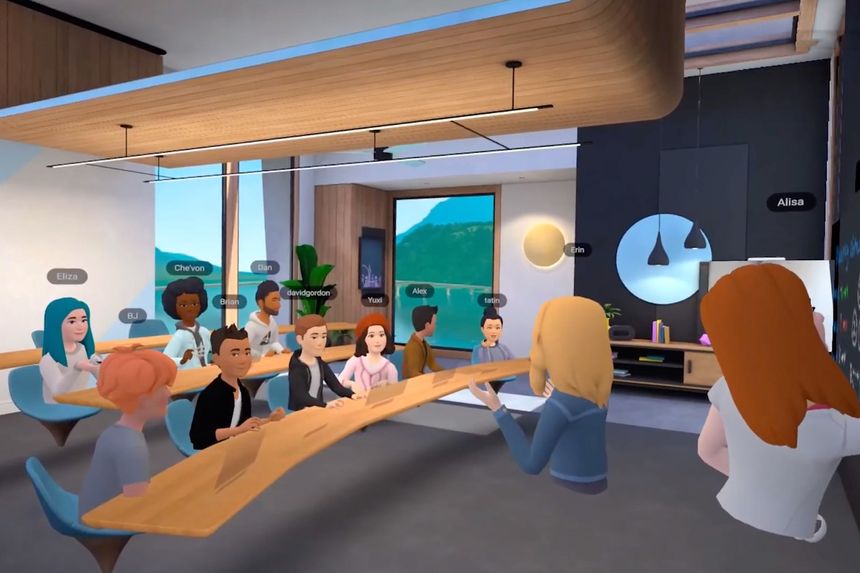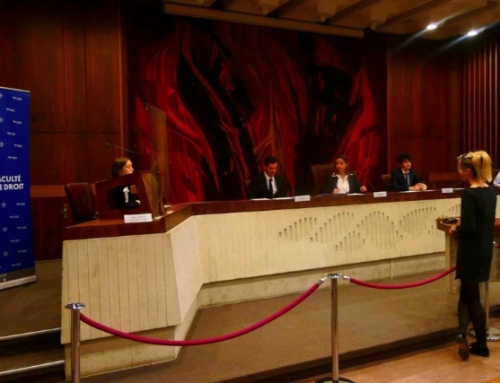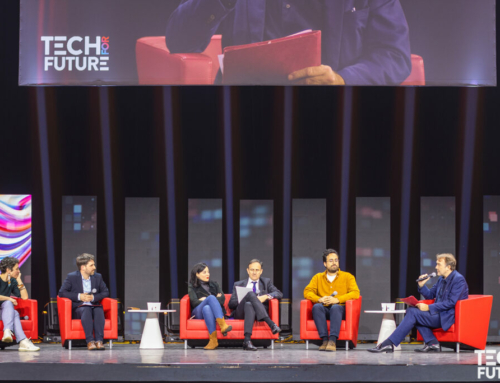If Facebook has become Meta, it’s perhaps to escape the reality of the announced decline of the empire led by Mark Zuckerberg, and to anticipate the darkness of our earthly future. We might as well go elsewhere, evoking a sort of modern-day sauve qui peut. Could we succeed in the virtual world when we’re currently failing to reconcile our human needs with the planet’s capacities? Should we imagine a marvellous virtual world, to escape the one in which we live, and in which we are neither happy nor fulfilled?
If we are to believe the various statements made by representatives of this great social network, which is gradually being abandoned, there is an incredible opportunity for new professions for those who adopt metavers today. Commenting on the partnership with the Simplon school, Laurent Solly, Meta’s VP for Southern Europe, recently stated: “We want to help create a collective metavers, by creating sustainable jobs for the entire digital ecosystem.” It would therefore be urgent to train the new generation in metavers, in order to build new spaces that will soon become advertising spaces (too).
But before we get to the impact on the world of education, what is the metaverse?
“The metaverse is a fictional virtual universe that allows individuals to interact in three dimensions in shared spaces. It’s a kind of Internet of the future, where we no longer surf online in two dimensions via browsers, but in 3D, using avatars and virtual reality headsets.” That’s a definition that brings together all the current players in this “virtual universe” in which they’re trying to sell us an island or jewelry in their new virtual boutique. “With the evolution of Web 3.0 technologies, we are convinced that virtual stores will not only replace traditional e-commerce sites, but also recreate a close link between brand and customer,” says Hugo Acket, CEO of Lucky One.
Once we’ve established that, for the time being, metavers are above all a 3D transposition of what the web has been offering for the past 30 years, what new uses could have an impact on our educational system?
The question of the actual novelty of these virtual worlds arises as a preamble. As Olivier Lamirault, Director of Innovation & Educational Technologies at EM Normandie, explains: “At EM Normandie, we created business creation and English language courses on Second Life fifteen years ago! Students could meet up on little islands in this virtual world and learn in an offbeat universe…”. For a variety of reasons, the experience of 15 years ago didn’t last. Today, the arrival of 5G, the development of virtual reality headsets and the average student’s equipment seem better suited to the resources required for virtual life.
Will metavers be better able to attract and accommodate tomorrow’s students? What are the concrete advantages of learning in a virtual world?
Flexibility and the ability to live immersive learning experiences seem to be the arguments most often put forward by those hoping for this revolution. Flexibility means that each student’s learning path will be entirely personalized, determined by the student himself (or rather, his avatar). In the virtual university, students can choose their course, their classes and, why not, their timetable, their professors and move from one room to another at their leisure, with no time constraints. Anne-Charlotte Monneret, General Delegate of EdTech France, confirms: “in metavers, students will benefit from a personalized pathway to help them project themselves into their future career, based on who they are and what they want to do”. No doubt this means that students will be able to discover and choose their future from among the thousands of choices on offer. An infinite number of futures will be laid out before him, just a click away, as long as he finds his way.
Another advantage is the ability to feel movements and interactions with objects and people in an augmented reality virtual world. You can even try to repair a car or plant carrots in the metaverse, without any false moves having any consequences. Everything from practicing certain gestures to conversing and pitching in front of an audience is possible, opening up new perspectives for teachers. Meta has already launched an application offering a virtual office, enabling every member of a company to take part in meetings, isolate themselves in their personal office, go to the gym or share a coffee on the terrace. So many experiences to be lived virtually, without leaving home.

How have universities around the world embraced these new worlds?
Several examples are worth highlighting here, starting with those of Université Paris Cité and Arts et Métiers. In the healthcare sector, Université Paris Cité directly integrates “metavers skills” into the continuing education program leading to a university diploma, the aim of which is to: “provide the means (knowledge and skills) to analyze, create and support the development of a metavers project in healthcare in its professional field (medical or other)”. The JENII project at Arts et Métiers is based on immersive, collaborative environments built around digital twins of real industrial systems. The project, which received 9.5 million euros in funding from the DemoES call for projects, demonstrates the ambition of a number of major players to work in virtual worlds and reap the full educational benefits. “JENII enables interaction with industrial reality through a virtual reality headset,” explains Xavier Kestelyn, deputy director general of Arts et Métiers, in charge of training. “In its optimized version, the digital twin developed as part of the project will offer a 3D representation that is visually realistic, physically accurate and functionally synchronous. This means that the situation will be similar to the real thing.”
Will anything be possible in these new worlds? Will students only live in virtuality? This is not the opinion of the DGA of Arts et Métiers, who points to the complementarity and even hybridization of the two worlds: “In addition to providing access to complex and rare environments, virtually manipulating expensive and dangerous equipment enables other teaching approaches, with less fear”, emphasizes Xavier Kestelyn. “Nevertheless, not everything can be taught in a virtual environment. We are working on a hybrid training model that can be deployed in other establishments.”
In addition, the UNIT Foundation is working on the development of a metavers project. UNIT has entered into discussions with Digital Universities to gain access to metaKWARK for this experiment. For its part, Nantes University will be organizing the first national meetings on the theme of “learning tomorrow with immersive technologies”, on Thursday September 15, 2022. The dynamism of the French academic world is as strong as ever.
What about other countries around the world?
The University of Hong Kong is also getting involved in metavers. Its main objective is to enable students on the Guangzhou campus to enjoy the same learning experience as their peers on the Hong Kong campus. Immersed in virtuality, wearing their headsets, they will be seated next to each other and able to converse, albeit physically distant.
In the United States, a large-scale project is bringing together a dozen universities, including West Virginia, Maryland, South Dakota and the University of Kansas School of Nursing in New Mexico. Called “Metaversities”, the project is being carried out by virtual reality company Engage in association with VictoryXR, a specialist in immersive training solutions. There too, students will be able to attend classes and explore a digital replica of their campus with other students in real time, without having to leave their homes. Courses will be offered on a variety of programs covering human anatomy, history and astronomy. Engage and VictoryXR are funded by Meta.
Finally, other projects are in full development, such as those in Tokyo and Canada.
But if we are to believe that we will all be able to learn in a different way (as Mark Zuckerberg repeats at will), we are obliged to note that some are taking the side of pleasing the companies. The opportunistic birth of a metaverse school is one such example. “We’re making a gamble, a poker game, because we’re convinced it’s going to take off”, Ridouan Abagri proudly proclaimed on March 11, at the presentation of the Metaverse College, which will open its doors in October at La Défense (5). The temptation is great to use this new world to standardize training more effectively, and to make immediately operational people who are ready to work with a helmet screwed on their head. At least, for the time being, as it seems that the helmet, an expensive and therefore inaccessible object, may soon disappear.
The merchandization of skills has already begun in the real world. The risk of an out-of-control acceleration of the knowledge economy is high. Even if it could be a new way of monetizing teachers’ pedagogical knowledge. If we are to believe the analysis put forward by John Preston, Professor of Sociology at the University of Essex in England, teachers would eventually become “creators of learning experiences”, and learners would move from university to university according to their preferred themes. However, the sociologist points out that the role of human interaction in the transmission of knowledge remains essential.
Are we going to accept an education shaped by the global giant in social networking and the exploitation of our personal data? Is the transmission of knowledge about to slip out of the hands of universities and teacher-researchers?
While we all wish to improve the performance of our education systems, it remains essential to preserve the singularity and quality of each nation’s own cultural dimension. Education is a public service in France, and must remain so for the most part.






